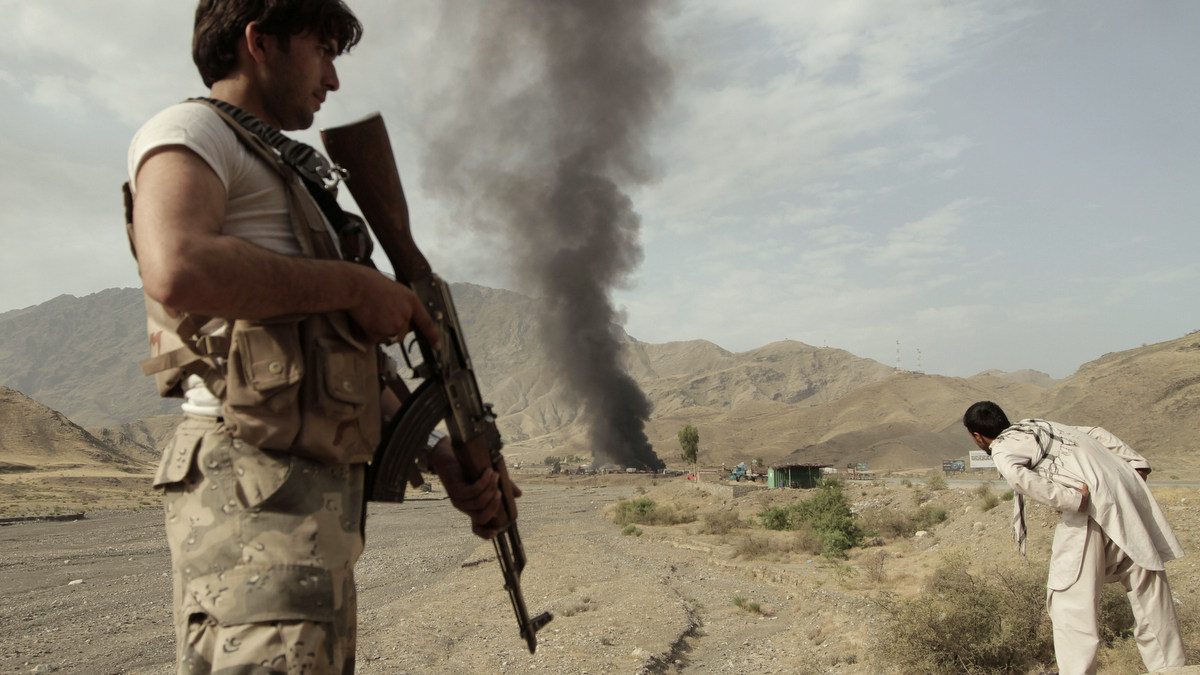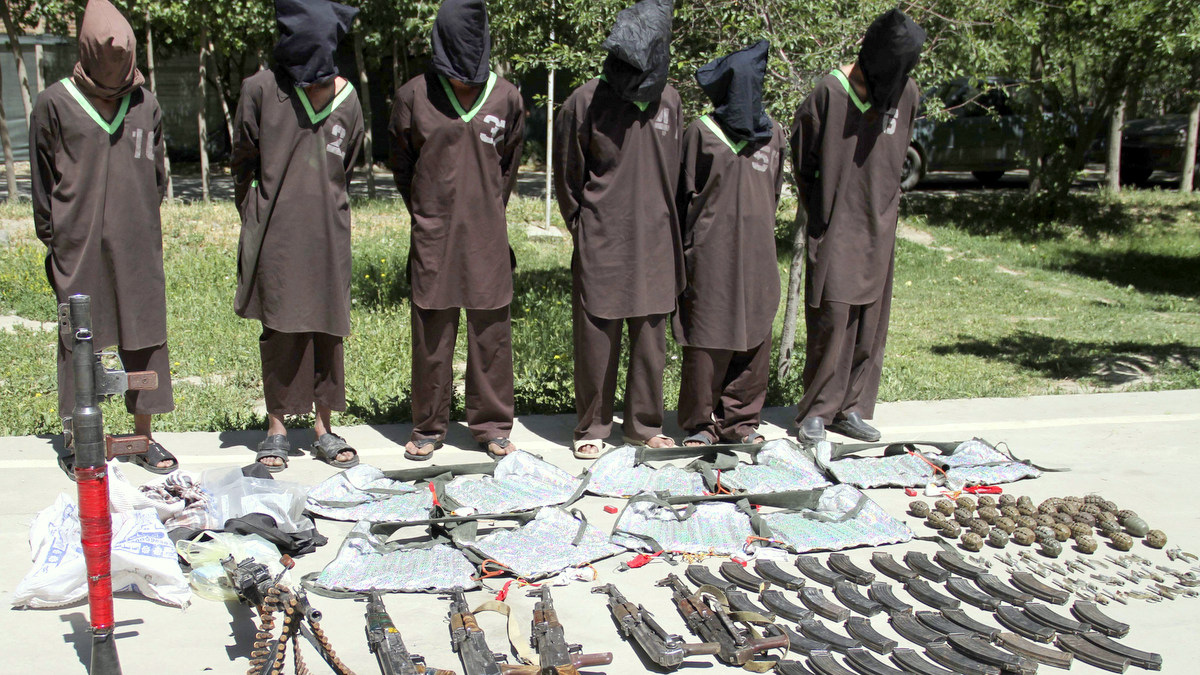
An Afghan policeman stands guard near the scene of an attack in Torkham, Nangarhar province, Afghanistan, Thursday, June 19, 2014. Afghan officials say three Taliban suicide bombers targeted NATO fuel trucks at the border with Pakistan, setting off a gunbattle with police guards. (Rahmat Gul/AP)
WASHINGTON — Dozens of Afghan students and others from around the country stood in front of the U.S. Capitol on Dec. 7 to demand that Congress cut all military funding to Pakistan.
“We want the international community to stop funding Pakistan under the name of the war on terror… and to stop supporting terrorists in the region,” said Habiba Ashna, one of the organizers of the “Stop Killing Afghans!” protest, to MintPress News.
Ashna, 25, who is a studying International Affairs at Sweet Briar College in Virginia, was referring to the history of support the Pakistani army and its intelligence agency, the Inter-Services Intelligence, have shown to the Taliban and other militant groups, such as the Haqqani network, which carry out suicide attacks and other violent assaults inside Afghanistan.
The feeling among the protesters on Capitol Hill that cold, blustery afternoon was one of frustration. “Pakistan constantly says that they’re gonna stop supporting the Taliban, but they go back on their words and end up supporting them for longer,” explained one attendee at the protest, who wished not to be named.
Signs at the demonstration said things like, “Taliban: The Veritable Arm of Pakistan’s ISI;” “Stop Making Human Bombs from Children;” and “ISI! Stop Killing Afghans.”
“We’ve had it!” Ashna told MintPress.
Over the past three weeks, there have been numerous terrorist attacks in Afghanistan, a country which just barely formed a national government in its second round of presidential elections held in June, and is trying to recover from decades of war.
One event that stood out to Ashna and convinced her to help organize the demonstration, along with coordinated protests in Toronto, Canada, and London, was a November suicide attack on a volleyball game in Paktika province, Afghanistan, which killed 57 people. AFP described the bombing as the “deadliest single attack since 2011.” Afghanistan’s intelligence agency, the National Directorate of Security, blamed the Haqqani network as being behind the attack.
“That was something that triggered the protest,” Ashna said. “We said, ‘Enough is enough!”’
The Pakistani embassy in Washington declined to comment on the protest.
Pakistan’s policy of support for militant groups
During the Soviet-Afghan war (1979-1989), Pakistan was used as a staging ground to plan, launch attacks, and coordinate mujahideen activities in collaboration with the United States. The country acquiesced in these activities, at the request of the U.S., because of its desire to wield influence in Afghanistan, which did not end with the war.
In his book, “Pakistan: Between Mosque and Military,” Husain Haqqani, former Pakistani ambassador to the U.S., wrote, “After Soviet troops withdrew from Afghanistan, Pakistan continued to support hard-line Islamist mujahideen in the ensuing civil war, leading to the rise of the Taliban.”
Haqqani, who has no connection to the Haqqani network, explains that the policy was used because the new nation-state wanted to assume the role of India’s British government in controlling Afghan policy, and collaborated with the U.S. to maintain its regional influence.
U.S. arms and money transfers to Pakistan, and by extension to mujahideen warriors in Afghanistan, were ramped up during the Carter administration from 1977 to 1981 to fight the Soviets. The U.S. committed itself to defending Pakistan in case of a communist attack on the country. It also escalated its assistance to the country for covert operations in Afghanistan through an initiative similar to a grant-matching program with Saudi Arabia.
Then-President of Pakistan Zia ul-Haq had convinced the U.S. and Saudi Arabia that Soviet forces could be led into a quagmire in Afghanistan if mujahideen forces were built up in the country to make their occupation unbearable.
The Haqqani network

Haqqani network operatives are presented to the media at the intelligence agents of Security (NDS) headquarters in Kabul, Afghanistan (AP Photo).
One of the most exemplary fighters who began to stand out during the Soviet-Afghan war was Jalaluddin Haqqani, of the Pashtun Zadran tribe, based in the Paktia and Khost provinces of Afghanistan near the border of Pakistan. He was the leader of what later became known as the Haqqani network, a Taliban group with links to al-Qaida, which is currently reported to have about 15,000 fighters.
The group found its way to Pakistan in the 1970s, when former Afghan President Mohammed Daoud Khan exiled Jalaluddin Haqqani from the nation. During his exile, Jalaluddin went to Miranshah, Pakistan, where he got acquainted with and became close to the U.S. Central Intelligence Agency and Pakistan’s ISI. He has since cut ties with the CIA due to disagreements over the U.S occupation of Afghanistan.
The late Asia Times journalist Syed Saleem Shahzad wrote that during the Soviet war in Afghanistan (1979-1989), Haqqani became one of “many legendary figures.” Shahzad added that after 2001, Haqqani was “the only real hope for the Taliban resistance movement to be successful against US-led forces in Afghanistan.” Haqqani has since retired leadership of the Haqqani network to his son, Sirajuddin Haqqani.
U.S. money and arms

Secretary of Defense Chuck Hagel addresses the press after meeting with Chief of Army Staff General Rahaeel Sharif in Islamabad, Pakistan on December 9, 2013. Hagel met with various Pakistani leaders as the first Secretary of Defense since Robert Gates to visit the country and discuss issues of mutual importance. Photo by Erin A. Kirk-Cuomo/Flickr)
In return for Pakistan’s patronage and assistance in fighting a war against the Soviets on behalf of the U.S., President Haq wanted to be rewarded with military and economic aid for his country — and he was. The Carter administration initially offered Pakistan $400 million in aid, which Haq turned down, calling it “peanuts.”
Then Ronald Reagan was elected.
The Reagan administration put together an aid package of $3.2 billion to be dispersed over a five-year period, followed in 1986 with another $4.02 billion to be given out over the following six years. These budget windfalls helped to bolster Pakistan’s military and give it unprecedented power over the state, which it still enjoys to this day. Military control over policy and state institutions is so powerful that Ayesha Siddiqa, an author and social scientist, coined the term “Military Inc.” to describe how it functions. There is also a popular aphorism in Pakistan, which states, “Most countries have armies, but in Pakistan the army has a country.”
Levels of U.S. aid to Pakistan have waxed and waned since the 1980s, according to American geo-political initiatives. Since 9/11, the country has received $19.34 billion in economic and military aid from the U.S. for its cooperation in the so-called “war on terror.”
Pakistan’s role in current attacks in Afghanistan
The Haqqani network is suspected of having very close ties to Pakistan’s intelligence. The “ISI, has been providing the Taliban with safe haven and sanctuary in Pakistan for over a decade. The ISI participates directly in planning Taliban operations and target selection against Nato and Afghan targets. It helps arm and fund the Taliban and assists its fundraising efforts in the Gulf states,” wrote Bruce Riedel, director of the Brookings Intelligence Project and a 30-year veteran of the CIA and advisor on the National Security Council, in a recent Brookings publication.
He continues, unabashedly, “Mullah Omar, the shadowy leader of the Taliban who calls himself commander of the faithful, divides his time between Quetta and Karachi, where the ISI provides his security. The Haqqani network keeps an office in Rawalpindi [a city next to Pakistan’s capital] near the ISI headquarters. General Sharif [Pakistan’s Chief of Army Staff] supervises all of this, just as his predecessors did before him. The general, not the prime minister, makes Afghan policy.”
However, some analysts disagree about the extent of the ISI’s culpability.
When viewing militant groups, such as the Haqqani network, as merely proxies in a war against nation-states, it becomes easy to overlook their ability to act as rational actors, explained Muhammad Amir Rana, director of the Pak Institute for Peace Studies (PIPS), an independent think tank based in Islamabad, in a recent article for Dawn, a Pakistani English-language daily based.
“No doubt, states nurture or support militant movements as their strategic assets and use them as foreign policy tools,” Rana wrote, noting that they also act of their own volition. Rana gave as an example recent initiatives by the Afghan Taliban to have separate talks with the U.S., rather than going through the ISI, which initially trained and funded the group.
To better understand the Haqqani network, which is allied with the Afghan Taliban, Rana wrote that the group should be viewed as an independent actor.
In defense of the Pakistani military, he wrote that “it would be a nightmare” for the Pakistani security establishment if the Afghan Taliban were to capture Kabul. He believes the Pakistani military and the ISI have less control over events in Afghanistan than many would like to believe.
“Only by removing false perceptions regarding militants and terrorists can we see them as independent and rational actors who not only pursue their own agendas but also attract and use resources and help offered to them by anyone,” he wrote.
“They keep changing, adjusting their strategies and tactics according to their need, even when some of their interests converge with those of the state.”
But there are numerous signs that Rana may be wrong. Just last year, it was reported that the Zadran Tribal Council, which represents Haqqani’s tribe, broke ties with Jalaluddin Haqqani over his connection to the Pakistani government. Faisal Rahim, a former Haqqani network commander and head of the tribal council, reportedly told journalist Azam Ahmed, “The tribe now understands who Mr. Haqqani works for.” He continued, “His war is not a holy war. It’s a war for dollars, for Pakistani rupees and for power.”
More damning evidence of Pakistan’s complicity in Afghan attacks — or at least the country’s unwillingness to thwart them — surfaced last month, when Sartaj Aziz, Prime Minister Nawaz Sharif’s adviser on national security and foreign affairs, said, “Why must we make enemies out of them all [the Haqqani network]?”
“It’s the job of the Afghan government to negotiate with them … We can try to convince them, however things are not the same as they were in the nineties” he continued.
According to Riedel though, they are. He wrote that the Pakistani “army’s goal in Afghanistan is victory and the creation of a puppet state in Kabul. That has been the goal since at least when Zia-ul-Haq took power in his coup [1977].” Ayesha Siddiqa, author of Military Inc.: Inside Pakistan’s Military Economy, confirmed Riedel’s interpretation of the current situation, and wrote that according to her source, “the CIA even met Mullah Omar in Karachi [in 2012].”
Back on Capitol Hill
Afghans at home and abroad are fed up. “It has been 13 years that the Pakistani military and the ISI are killing innocent people in Afghanistan,” said Gul Muhammed, who attended the protest in Washington.
“I want Pakistan and the whole world to please stop this madness in Afghanistan,” he continued.
Jawad Sharif, another protester at the rally, echoed Muhammed’s views, saying, “Pakistan has used Taliban in Afghanistan to achieve their foreign policy agenda!”
He said that Pakistan’s goals purposely undermine the Afghan government and its people through terrorizing, killing, and turning Afghans against one another.
“Pakistan is making sure that Afghans do not live in peace, and their whole purpose in Afghanistan is to create a terrorized population,” he concluded.

